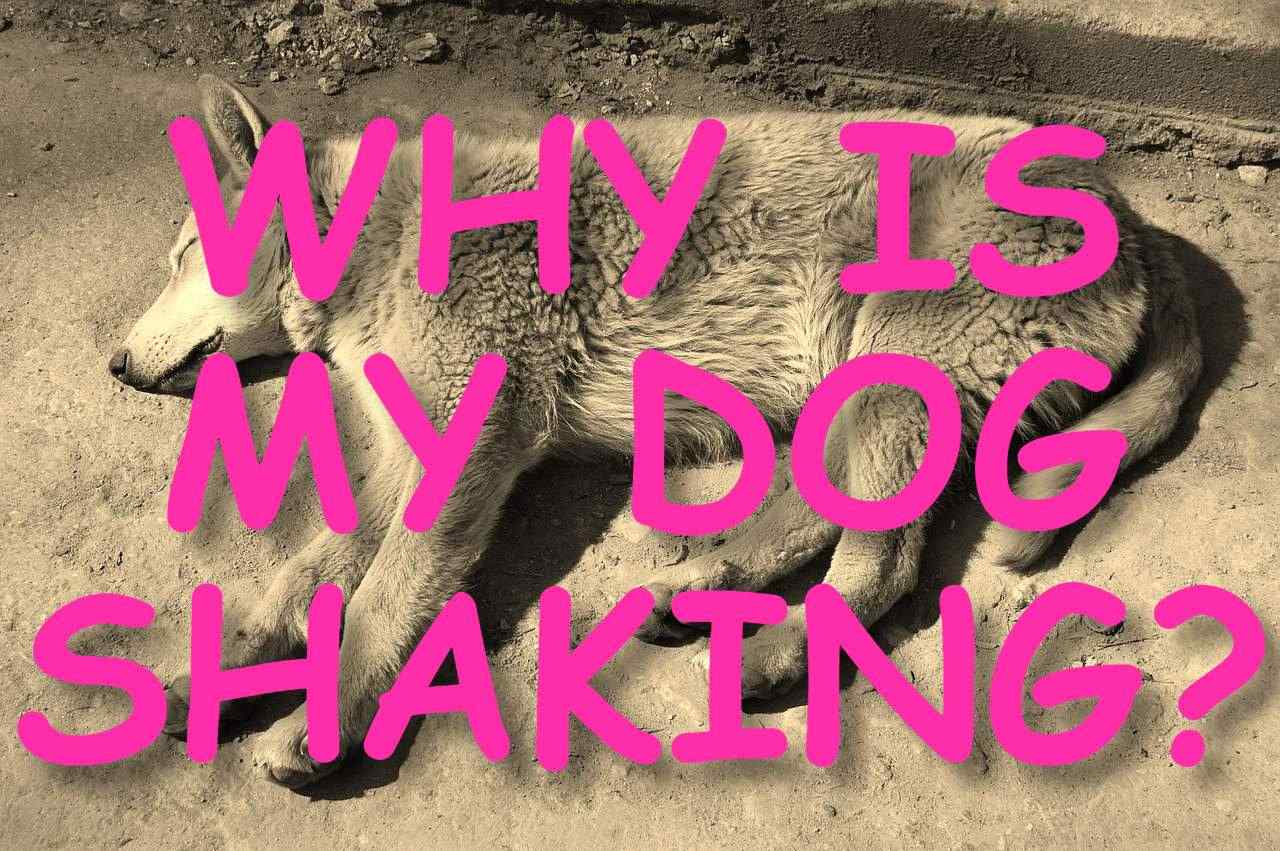Table of Contents
Intro Why Is My Dog Shaking
If you've recently noticed that your beloved pet dog is shaking, it can be concerning and worrying. It's important to understand why this is happening in order to get the right treatment for your pup. In this article, we'll discuss some potential causes of trembling in dogs and what you can do to help. From fear and anxiety, to health issues such as hypoglycemia or liver disease, there are a variety of things that may cause a dog to shake.

Common Reasons Why Your Dog is Shaking And Shivering
If you have noticed that your dog is shaking, it could be due to a variety of reasons. Trembling and shaking in dogs can be caused by physical or emotional factors. One of the most common causes of shaking is anxiety. Dogs can become anxious due to loud noises, changes in their environment, separation anxiety or fear.
Another reason why your dog might be shaking is pain or discomfort. This could be caused by an injury or underlying medical condition such as arthritis or hypoglycemia. If your dog has been injured recently and appears to be in pain, then it's important to take them to a vet as soon as possible.
Finally, if you have ruled out any physical causes for the shaking then it may simply be due to cold weather. Just like humans feel chilly when temperatures drop outside, so do dogs! So if you notice that your furry friend is shivering on a cold day then try providing them with a warm blanket or sweater to help keep them cozy and comfortable.

Physical Causes Of Shivering: Injury, Pain, Fever
If your dog is shaking, there may be physical causes behind it. Injury could be one reason – if your dog has been hurt or trauma has occurred, he may shake as a way of dealing with the pain. Pain itself can also cause shaking in dogs, especially if it is chronic and ongoing. If you notice any other signs of discomfort or behavior changes accompanying the shaking, it's important to take them to see a vet.
Fever can also lead to shaking in dogs. Similar to humans, when our body temperature rises too high due to an infection or illness we experience shivering and tremors as a response. This is your pet’s immune system trying to fight off the underlying problem causing the fever. A simple and quick way to check for fever at home is by taking their rectal temperature with a digital thermometer.
Overall, if you are concerned about your dog’s trembling behavior, visit your veterinarian for an examination so they can diagnose what the root cause might be that's triggering these symptoms.

Mental Causes For Your Dog Shivering: Stress, Fear, Anxiety
If you notice your dog shaking or trembling, it could be due to mental causes such as stress, fear, or anxiety. Dogs can experience emotional distress just like humans do and it's important for pet owners to recognize the signs of these mental states.
Stress in dogs can stem from a variety of factors such as changes in their routine or environment, separation anxiety when left alone, or even from loud noises like thunderstorms. Fear and anxiety can also cause shaking in dogs and may be triggered by specific situations such as meeting new people or animals.
If you suspect that your dog is experiencing stress, fear, or anxiety it's important to provide them with a safe and comforting environment. This may include creating a designated space for them to retreat to when feeling overwhelmed or providing them with calming supplements recommended by your veterinarian. Additionally, taking steps to address any underlying issues causing these emotions can help alleviate symptoms of shaking in dogs.

Medical Conditions That Can Cause Shivering In Dogs: Vestibular Disease, Hypoglycemia
Vestibular disease and hypoglycemia are two medical conditions that can cause dogs to shake. Vestibular disease is a condition that affects the balance and coordination of a dog. It can be caused by a variety of factors, including infections, tumors, or trauma to the brain or ear. Symptoms of vestibular disease include head tilt, difficulty walking or standing, and eye movements that are not coordinated.
On the other hand, hypoglycemia occurs when a dog's blood sugar levels drop too low. This can happen for many reasons such as stress or an underlying medical condition like diabetes. Symptoms of hypoglycemia include shaking or trembling, weakness, confusion or disorientation and seizures in severe cases.
If your dog is shaking and you suspect they may have either vestibular disease or hypoglycemia it is important to consult with your veterinarian. A proper diagnosis will help determine the best course of treatment for your pet's specific needs.

GTS Generalized Tremor Syndrome Can Cause Shaking
GTS, also known as Generalized Tremor Syndrome, can cause shaking in dogs. Shaking in dogs can be a sign that your dog is experiencing discomfort or pain. Many dogs may shake, shiver, or tremble due to various reasons, such as fear, cold, excitement, or anxiety. However, if you notice frequent and excessive shaking, head shaking, or tremors that last for a prolonged period, it may be a sign of something more serious, such as GTS. GTS is a neurological disorder that affects dogs of any age, breed, or gender.
It is characterized by episodes of involuntary trembling, which can resemble a seizure or shaker syndrome. Some common symptoms of GTS may include sudden onset of tremors, head tremors, muscle spasms, and stiffness. If you suspect that your dog has GTS, it is essential to take them to a vet for proper diagnosis and treatment.
Distemper can also be a cause of tremors in dogs, and it is essential to vaccinate your dog against this virus to prevent it. In conclusion, if you notice any abnormal shaking in your dog, it is crucial to seek medical attention to ensure your dog's well-being.

Shaking In Dogs Could Be A Sign Of Muscle Weakness
If you notice your dog shaking or shivering for no apparent reason, it could be a sign of muscle weakness. A vet visit is highly recommended to give your furry friend the proper care and treatment they need. While shaking can be caused by a seizure or a variety of other reasons, muscle weakness is one of the more common reasons a dog can shake.
Dogs that have distemper might also shake a lot, but muscle weakness tends to be the most common cause. It's important to determine whether or not your dog is in pain or simply uncomfortable before administering any type of treatment. Your vet is able to determine the root cause of the shaking, and prescribe any necessary medications to help your dog feel better.
Muscle weakness is a serious issue and should be addressed as soon as possible. If your dog is hunched over, unable to move, or showing any signs of distress or discomfort, be sure to get them to the veterinary clinic as soon as possible. With the right care and attention, your dog will feel better in no time.

Think Your Dog May Have Distemper
If you have concerns that your dog may be suffering from distemper, there are several things you should be aware of. This highly contagious disease affects a dog's respiratory, gastrointestinal, and nervous systems which can lead to symptoms such as shivering, seizures, and trembling. If you notice any of these symptoms, you should immediately call your veterinary care provider.
Distemper is a serious disease that requires prompt treatment to prevent further complications and potential long-term health issues. It can also be accompanied by other signs such as vomiting, fever, cough, and watery eyes. Your dog may also be in pain or disoriented as a result of these symptoms.
Therefore, it's essential to seek out veterinary attention as soon as possible. In some instances, a seizure disorder could be the cause of shaking or tremors, and it is crucial to rule that out as well. In summary, if you're wondering why your dog is shaking, and you think it may be due to distemper, calling your vet is the best course of action. Early detection and treatment can improve the outcome and prevent complications.

Treatment Options For Trembling In Dogs: Medication, Behavior Modification
If your dog is shaking, it could be a sign of an underlying medical condition. Treatment options for medical conditions that cause shaking include medication and behavior modification. Your veterinarian can help determine the best course of treatment for your dog's specific condition.
Medication may be prescribed to treat medical conditions such as epilepsy or pain. The type of medication and dosage will depend on the severity of the condition and the size and age of your dog. It is important to follow your veterinarian's instructions carefully when giving medication to your pet.
Behavior modification may also be recommended if shaking is caused by anxiety or fear. This can involve training techniques or environmental changes to help reduce stress in your pet's life. It is important to work with a qualified trainer or behaviorist who can help assess your pet's needs and develop an appropriate plan for addressing their anxiety or fear.

Prevention Strategies: Training, Exercise
Training and exercise are crucial components in preventing dogs from shaking excessively. Firstly, training helps to reinforce good behavior and socialization skills, which can reduce stress levels and anxiety in dogs. This can result in fewer instances of shaking or trembling, as these behaviors are often associated with nervousness or fear.
Secondly, regular exercise is essential for maintaining a dog's physical health and mental well-being. Dogs that do not receive adequate exercise may become bored or restless, leading to excessive shaking or other unwanted behaviors. Exercise can also help to reduce stress levels and promote relaxation in dogs.
It is important to note that excessive shaking can also be a symptom of an underlying medical condition, such as pain or discomfort. If your dog continues to shake despite proper training and exercise, it may be necessary to consult with a veterinarian to rule out any potential health issues.

Conclusion: Understanding the Causes and Solutions And When To See A Vet
In conclusion, understanding the causes and solutions to why your dog is shaking can help you provide proper care and attention to your furry friend. Shaking or trembling in dogs can be caused by a variety of factors, including anxiety, pain, illness or disease, among others.
To address the issue of shaking in dogs, it is important to identify the underlying cause first. If it is due to anxiety or fear, techniques such as desensitization or counterconditioning may be helpful. In cases where pain or illness is causing the shaking behavior, seeking veterinary advice and treatment is recommended.
Overall, being aware of your dog's behavior and changes in their physical state can help you detect any potential health issues early on. Providing proper care and attention to your canine companion will ensure they remain healthy and happy for years to come.

Related Articles
Hills Pet Why Is My Dog Shaking And Shivering?
https://www.hillspet.com/dog-care/behavior-appearance/why-is-my-dog-shaking-and-shivering
My Family Vet Why Is My Dog Shaking?
https://www.myfamilyvets.co.uk/why-is-my-dog-shaking
AKC Why Is My Dog Shaking?
https://www.akc.org/expert-advice/health/why-is-my-dog-shaking/
RD Why Is My Dog Shaking?
https://www.rd.com/article/why-dogs-shake/
Parade Pet Why Is My Dog Shaking?
https://paradepets.com/dogs/why-is-my-dog-shaking
Pet Plan Why Is My Dog Shaking?
https://www.petplan.co.uk/pet-information/dog/advice/dog-shaking/
Pet Health Network Why Is My Dog Shaking?
https://www.pethealthnetwork.com/dog-health/dog-behavior/why-my-dog-shaking
Met Life Insurance Why Is My Dog Shaking?
https://www.metlifepetinsurance.com/blog/pet-behavior/why-is-my-dog-trembling/
Every Paw Why Is My Dog Shaking?
https://www.everypaw.com/all-things-pet/why-is-my-dog-shaking
IAMS Why Is My Dog Shaking?
https://www.iams.com/dog/dog-articles/why-my-dog-shaking
Bayside Animal Hospital Why Is My Dog Shaking?
https://www.baysideanimalhospitalonline.com/blog/why-is-my-dog-shaking-so-much/
Pure Pets Insurance
https://www.purelypetsinsurance.co.uk/blogs/why-is-my-dog-shaking/?page=1
Nerd Momma Why Is Chocolate Bad For Dogs?
https://nerdmomma.com/why-is-chocolate-bad-for-dogs-6-alarming-facts/#more-2849
Nerd Momma Why Do Dogs Wag Their Tails?
https://nerdmomma.com/why-do-dogs-wag-their-tails-9-tail-wag-facts/#more-2603
